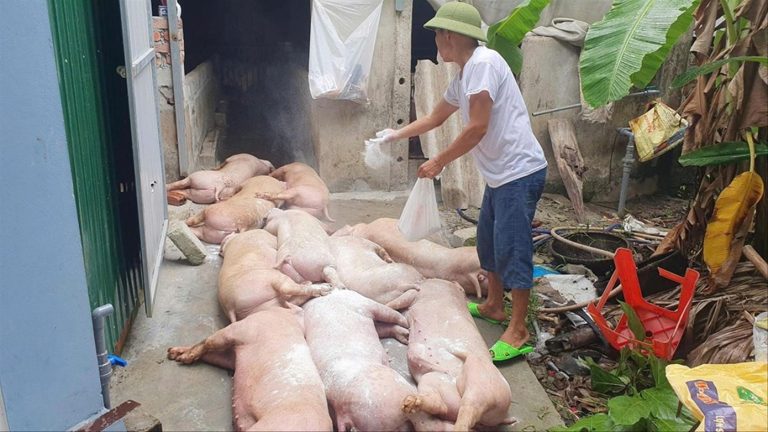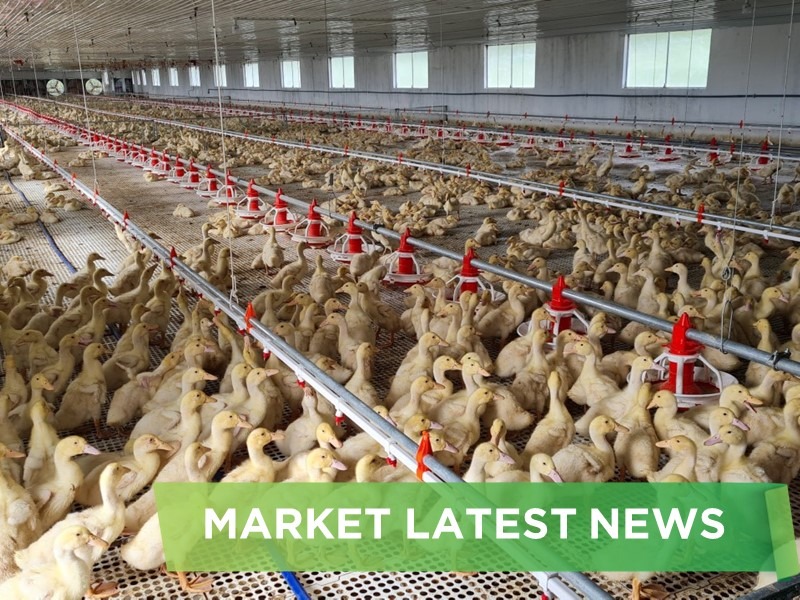African swine fever (ASF) has spread to all provinces and cities across the country. According to the Ministry of Agriculture and Environment, by August 1, ASF had appeared in 33/34 provinces and cities, forcing the culling of more than 100,000 pigs. Why has the disease not been controlled yet?
Most provinces and cities have outbreaks
Since the beginning of 2025, ASF has appeared in a number of localities on a small scale. At that time, many experts expected that with experience from previous outbreaks, ASF would soon be controlled. But in reality, the disease spread very quickly. By May, the number of outbreaks had increased to nearly 300, and the number of dead and culled pigs had exceeded 20,000. In mid-July, the Ministry of Agriculture and Environment reported that there were 514 outbreaks nationwide in 28/34 provinces and cities, with more than 30,000 pigs culled. As of August 1, the epidemic had broken out in 33/34 provinces and cities, with a total of 972 outbreaks in 718 communes and wards, causing more than 100,000 pigs to become sick, die or be destroyed. This raises concerns about the ability to control the epidemic as well as the sustainability of the pig farming industry - an industry that accounts for 65% of meat production in the Vietnamese diet.

People sprinkle lime to destroy African swine fever
Thanh Hoa is one of the "hot spots", ASF has appeared in 826 households in 61 communes and wards, forcing the destruction of nearly 7,000 pigs, with a total weight of nearly 400 tons. Da Nang city, the epidemic spread to 39 communes and wards, destroying more than 4,770 pigs in July alone. Cao Bang and Lang Son are two mountainous provinces with a high rate of small-scale pig farming households, having to destroy nearly 7,700 and 5,600 pigs, respectively. Not to mention, as of early August, there were still 542 communes and wards where the epidemic had not passed 21 days, meaning the risk of further widespread outbreaks was very high.
Faced with the complicated developments of the epidemic, in mid-July, Prime Minister Pham Minh Chinh signed an official dispatch directing the drastic and synchronous implementation of solutions to prevent and control ASF. The Prime Minister requested provinces, cities, ministries and branches to drastically and synchronously implement solutions to prevent and control ASF, thoroughly handle the outbreak, prevent widespread spread; prevent and resolutely handle cases of buying, selling, transporting sick pigs, and dumping dead pigs, causing the spread of the disease and environmental pollution.
Recently (July 23), at the national conference, the Ministry of Agriculture and Environment, together with localities and experts, sought solutions to the problem of preventing and controlling ASF and managing and controlling animal slaughter to ensure disease safety and food safety.
On August 1, the Standing Committee of the Party Committee of the Ministry of Agriculture and Environment sent a document to the Standing Committees of the provincial and municipal Party Committees directly under the Central Government, emphasizing the need to focus on leadership, drastic direction, and synchronous measures to prevent and control the epidemic. The document requires local Party committees and authorities to consider this an urgent task, aiming to control the epidemic, limit damage to the livestock industry, ensure food safety, help farmers overcome difficulties, and have conditions to restore herds after the epidemic.
What is the core solution?
Speaking to Tien Phong, Mr. Nguyen Xuan Duong, Chairman of the Vietnam Livestock Association, assessed that ASF has broken out on a very large scale, spreading across the country, seriously affecting the livestock industry, especially the supply of pork. Although the epidemic is not new, its complex nature and high potential for spread make it impossible for most localities to claim to be "absolutely safe". According to him, the price of live pigs has been continuously high since the beginning of the year, fluctuating between 60-70 thousand VND/kg, because the supply cannot meet the demand. It is forecasted that the price may remain at 65 thousand VND/kg in the coming time due to the impact of ASF. According to Mr. Duong, the reason for the widespread epidemic is that biosafety in livestock farming has not been implemented, especially in small-scale livestock farming areas interspersed in residential areas. Pathogens exist in abundance in the environment, and if there is a gap, the virus will re-enter. Mr. Duong said that the current vaccine cannot be completely replaced because it is only applied to pigs for meat, not fully protecting groups of breeding pigs or sows. Mr. Duong emphasized that the important solution to control the epidemic is biosecurity in livestock farming, not only in technical processes but also in the awareness of farmers. Large, isolated farms that control people, climate, food, water sources and isolate workers will prevent epidemics better. Meanwhile, small-scale farmers find it difficult to ensure these standards and lack awareness of epidemic prevention. Another dangerous channel: Uncontrolled small-scale slaughter, diseased pork or pig carcasses thrown into the environment all spread the virus. Current methods of destruction such as burning or burying are still not a radical solution, and more appropriate treatment needs to be researched.
Regarding herd restoration, the Chairman of the Vietnam Livestock Association warned against following the "at all costs" trend. "Restore herds only when disease safety conditions are met; if you are impatient, the risk of damage will be greater. At the end of the year, the epidemic often develops complicatedly due to favorable weather conditions for the virus to develop and high herd restoration density," said Mr. Duong. The Chairman of the Vietnam Livestock Association also requested that local management agencies strengthen propaganda, supervision, inspection and strictly handle acts of hiding the epidemic, dumping sick pigs, and not complying with veterinary regulations. Livestock farmers need to proactively coordinate and report promptly.
Sharing on this issue, Mr. Nguyen Trong Long, Director of Hoang Long Cooperative, said that an important factor in preventing ASF is to ensure biosafety in livestock farming, for both farm owners and the entire team of workers; from the input stage, output of pigs, to means of transport, all must be cleaned and disinfected.
According to Mr. Long, the principle of biosafety must aim at the most effective, yet simplest measures for workers to easily implement, avoiding complicated situations leading to countermeasures.
(Luu Trinh Source: Tien Phong Newspaper)










